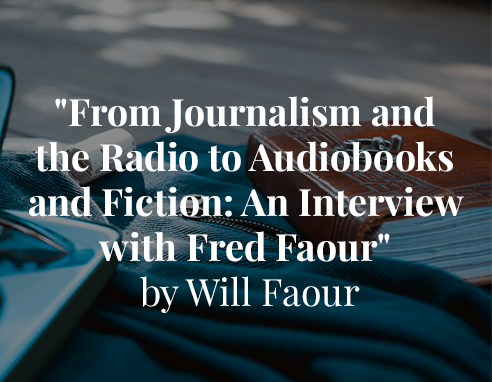|
|
Fred Faour is a radio host, reporter, and the author of the recent novel Jesus Just Left Chicago. He grew up in Galveston and went to U.H. for college. After graduating, he became a full-time journalist and became sports editor of the Houston Chronicle in 2005. Today, he hosts a radio show on ESPN and has recently shifted to focus more on writing, which was previously only a hobby. Jesus Just Left Chicago is his fiction debut. He is also the executive director of Gow Media Publishing, an audiobook company that launched in 2015. W: How did you start writing? F: Well, it’s just something I’ve always kind of done, ever since – really, I guess it goes back to high school. I took a journalism class because both of my parents were in journalism, and my first column won a UIL award. And I kind of just picked that up from there. It was not something that I intended to do, but once that happened, I got interested in it. W: Alright, so building on that, how would you say that your background in journalism – because you have a pretty storied career with that – how would you say that’s impacted your fiction writing? F: I think it’s impacted it in terms of – you know, what I try to do is, as Elmore Leonard says, leave out the parts of the story that people tend to skip. And I think it taught me to write in time, it taught me to write, for stories to move fast, and you can still put a lot of detail, but I’m the kind of person that, I don’t like reading a four page description of a joust. It just doesn’t work for me, and so I try not to write that way, I try to write where it’s very tight, it’s very journalistically styled, and for me, it gauges the reader more. W: Would you say that you find some value with how Hemingway wrote his stuff? Because he was also a journalist and went into writing afterward, and that kind of heavily impacted how he wrote. F: Certainly, that was a bit of an inspiration early in my career, that there’s a guy who went from the same business I was in to doing that. I’d say Hemingway, Elmore Leonard as I mentioned, is a big influence, I love the way that Stephen King could come up with a character in one paragraph that you’d care about and kill him off. And then Douglas Adams. All those guys have a style that is a little different from what other people do, so yeah, I think Hemingway being what he did was an inspiration, but so are those other guys. W: What else outside of the literary sphere has influenced how you write? F: Besides doing journalism, obviously I’ve been doing radio for ten years, and in that medium, you have to be visual. Your descriptions have to be visual, so what I’ve always tried to do is see the story in my head before I write it and then write visually that way almost as if I’m writing a comic book, but I’m trying to see it, so I think being in radio helps with that because I spent a lot of time trying to paint pictures with words and do it in a very quick manner because I’ve only got basically fifteen seconds to get your attention on radio, and then I need to keep your attention for five minutes after that so that your [ratings] meter will count. That’s kind of the same thing I try to do with writing. You see it, you describe it with words, and then hopefully people see it in their heads when they read it. W: Alright, so now I’m going to ask you a few questions about Jesus Just Left Chicago. Basically, what’s the story behind that? Because I know you’ve been working on it for more than twenty years. F: It was just an idea I had a long time ago from going to the racetrack all the time. There was the same group of guys there every day, and there’s something spiritual to that. I was driving home one night, and I was listening to this ZZ Top song, and it’s basically Jesus just left Chicago, he’s on his way to New Orleans, and I’m just thinking one night, where would he go in between? Well, maybe he’d stop at the race track in Houston and make everybody money, and that’s where the concept came from. And I sort of took several short stories that I’d written, and I noticed kind of a common theme, this theme of redemption and lost souls trying to find some way to redeem themselves for something that they did, and so I started combining characters from these short stories. For instance, Michael [one of the protagonists] was from a short story I wrote called “31” where he would hear a different song every time he’d kill somebody, and the thirty-first, he killed thirty people, thirty-first one was him, and I just liked the character, so I introduced him to this. So a lot of it’s based on some of the people I knew at the track, some of it’s based on characters that I developed for other projects, and I just kind of kept tinkering with it and tinkering with it, and finally, I guess about four years ago, one of my former students had read the first chapter and wanted to make a movie out of it, and I said, well, I better finish it, so I changed the time frame to 2008 – it was originally set in the mid-nineties – and it all kind of came together from there. I pretty much finished it in a weekend. W: Can you talk about your experiences with publishing it? F: Yeah, I’d had an agent who – I haven’t had good experience with any agents. She had a couple of deals for us and wasn’t really happy with them, so the company I worked with, we do a lot of different types of businesses, audiobook businesses, things like that, so we decided to publish it ourselves, and because we have a huge marketing reach with the radio stations, with our websites, I’m glad I did it because we’ve already made much more off of it than we would’ve if we’d gone the traditional route. The response has been great, and it’s really starting to take off nationally now. W: So, you were also involved in the process for creating the audiobook, right? F: Yes. W: So, can you talk a little bit about what that was like? Were there any unique challenges in the transition from the page to vocals? F: It’s funny because this is the first one I’ve done where I didn’t voice it myself. I did a horse racing book and a gambling book that we did as audiobooks, and it was much different because when you write, you’re going for a certain thing, but narration’s totally different, and so the challenge was finding the right people to do it. It was really cool to hear their interpretations of the characters. It was almost like actors taking your script and taking it in a different direction. Almost everybody made it their own. And it was really cool because I think the audiobook is much more emotional even than the written version because of the way that they handled it. W: In general, Gow Media Publishing tends to focus on audiobooks. Audiobooks are really popular. What do you think makes them so important and popular in general? F: One of the things we’ve always tried to do with our company is stay ahead of everything. And the audiobooks make a lot more sense. People are stuck in traffic, or they go to the gym, and they can listen that way, and I really think that we’re still a few years ahead of where the audiobook business is going to be, but for us, it was such an easy transition because we had the equipment there to record it. It’s very easy for us to do and doesn’t cost us anything, so basically, we get paid every time somebody buys one. Long term, I’d like to see us do textbooks because our costs are so low, and I know how much it costs to go to college and how much textbooks cost, I’d love to be able to get into that business because everybody does everything on their phone now, they’ve got their whole life on their phone, why not get audiobooks on it? W: That makes sense. So, you mentioned earlier that you wrote a lot of short stories, and you still do, right? F: Yeah, I still do, I haven’t written anything new in about a year and a half, I’ve been working on the sequel to Jesus and making a lot of progress on that, but there’s a bunch of them that are on my blog that I’ve written over the years and tweaked. I’d probably say there’s about, there’s five or six on there, there’s probably another eight or ten running around somewhere that I don’t know where they are, but most of those are ones that I transitioned into the novel. But every now and then, I get inspired to write a new project, but right now, the real focus is on getting the sequel done, and then I’ve got another one after that. It’s about seventy percent done. Gonna spend the next few months finishing those up. W: Alright, so can you walk me through your process for writing a short story, from whenever you get your idea to when it’s on the page and done? F: Well, it’s very similar to as I was mentioning earlier, where you have to see it. With a short story, you’re really looking for one moment. You’re leading up to that one moment at the end, and people are gonna go wow. And so I try to see that moment for what it’s gonna be, and then I write to it. In a novel obviously, you’re looking for a lot of wow moments. You’re trying to keep as many in there, get as many in there as you can without overwhelming the reader to where it just comes off as, oh, he’s just going for shock value. But the best short stories are always the ones that have the twist at the end, that have the thing you didn’t see coming. When I write those, that’s what I’m building up to, that moment. Really, all I think is for one moment. That’s the big difference. W: So you’re big on Houston’s sports scene, and you grew up in this part of Texas. How would you say that’s impacted your outlook on life? F: Well, you learn to live with disappointment as a Houston sports fan, that’s for sure. No, I think it’s, having grown up in this area – and most of the stuff I write has been based in Houston and Galveston and places like that – I would say I’ve gotten a much better education on life here than a lot of people get, especially with writing. It’s like, ‘oh, you have to go to New York,’ and it’s like, nah, not necessarily. So yeah, I think from that perspective, it’s just, I’ve been around a lot of very interesting, creative people, and that’s helped me develop. W: You’ve really carved out your own niche in Houston culture with the sports scene. Are there any ways you can give artistic value to sports or the culture surrounding it? F: I think writing about it has its own artistic value, and that’s something that obviously, I do a lot of. It’s a different kind of skill, but in the end, it’s all just content creation, and that’s where the art of it comes in. Whether it’s radio, whether it’s a quick video, whether it’s writing a sports story, whether it’s diving in deeper to a sports story, or whether it’s writing a short story or a novel, it’s all content creation, and basically, they’re all the same. You’re using the same skills, you’re using the same abilities, and there’s very much an art to it, but for me, it starts with the radio show because that’s the most interactive. Everything else, you’re kind of speaking to an audience. With this, you’re being interactive, and there’s very much an art form to that, and that sort of transitions into everything else. It’s like Douglas Adams said, “the fundamental interconnectedness of all things.” Everything I do is connected. It’s just, you’re using it in different ways. |
|
William Faour is a native Houstonian who enjoys studying humanity and the arts. When he’s not spending time with his pets, he can often be found following local and national politics or trying to write, with mixed results. His work has previously appeared in the pages of Texas’ Best Emerging Poets and Glass Mountain. He’s currently enrolled at the University of Houston as a senior and plans to graduate this semester with degrees in creative writing and political science. |
|


